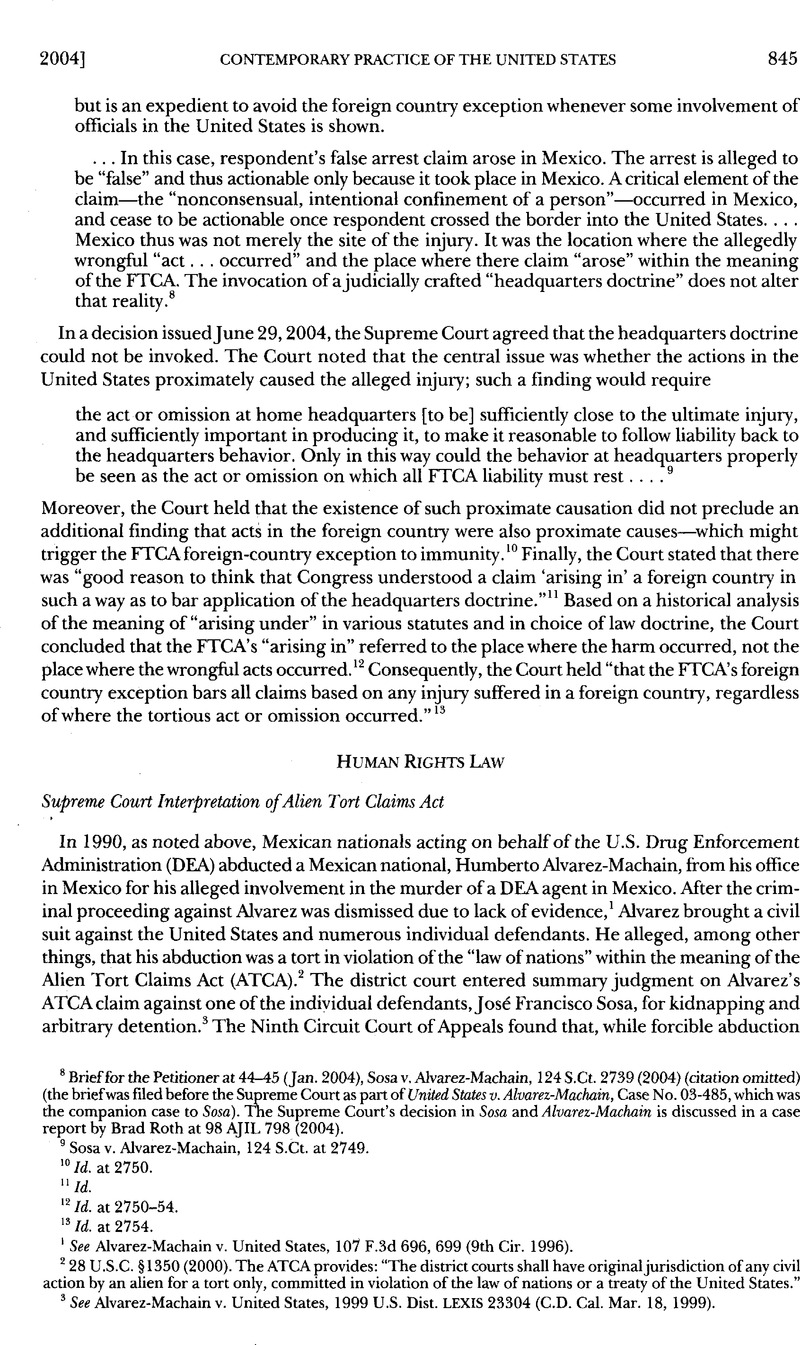Article contents
Supreme Court Interpretation of Alien Tort Claims Act
Published online by Cambridge University Press: 10 March 2017
Abstract

- Type
- Contemporary Practice of the United States Relating to International Law
- Information
- Copyright
- Copyright © American Society of International Law 2004
References
1 See Alvarez–Machain v. United States, 107 F.3d 696, 699 (9th Cir. 1996).
2 28 U.S.C. §1350 (2000). The ATCA provides: “The district courts shall have original jurisdiction of any civil action by an alien for a tort only, committed in violation of the law of nations or a treaty of the United States.”
3 See Alvarez–Machain v. United States, 1999 U.S. Dist. Lexis 23304 (CD. Cal. Mar. 18, 1999).
4 Alverez–Machain v. United States, 331 F.3d 604, 620 (9th Cir. 2003).
5 GA Res. 217 (Dec. 10, 1948).
6 Dec. 16, 1996, 999 UNTS 171. By contrast, the Eleventh Circuit Court of Appeals in 2002 held, in part, that the ICCPR is not self–executing and “does not create judicially–enforceable individual rights.” United States v. Duarte–Acero, 296 F.3d 1277,1283 (11th Cir. 2002); see also United States v. Matta–Ballesteros, 71 F.3d 754 (9th Cir. 1995). In Duarte–Acero, the ICCPR was raised by a criminal defendant who, in an effort to support dismissal of his indictment, argued that he was forcibly abducted abroad and brought to the United States.
7 Brief of Amicus Curiae the European Commission in Support of Neither Party at 3–4 (Jan. 23, 2004)Google Scholar, Sosa v. Alvarez–Machain, 124 S.Ct. 2739 (2004). The Sosa case is discussed in a case report by Brad Roth at 98 AJIL 798 (2004)Google Scholar.
8 Brief of the Governments of the Commonwealth of Australia, the Swiss Confederation and the United Kingdom of Great Britain and Northern Ireland is Amid Curiae in Support of the Petitioner at 27 (Jan. 23, 2004)Google Scholar, Sosa v. Alvarez–Machain, 124 S.Ct. 2739.
9 Brief for the United States as Respondent Supporting Petitioner at 11–24 (Jan. 2004)Google Scholar, Sosa v. Alvarez–Machain, 124 S.Ct. 2739.
10 [Editor’s Note: Flores v. Southern Peru Copper Corp., 343 F.3d 140, 154 (2d Cir. 2003).]
11 [Editor’s Note: Erie rejected the long–standing practice of federal courts to fashion a federal common law on tort, and instructed those courts to apply the laws of die several states as rules of decision in civil cases in which jurisdiction is based on diversity of citizenship.]
12 [Editor’s Note: The clause provides that Congress shall have the power “[t]o define and punish Piracies and Felonies committed on the high Seas, and Offences against the Law of Nations.”]
13 Brief for the United States, supra note 9, at 27–29.
14 Sosa v. Alvarez–Machain, 124 S.Ct. at 2754–55.
15 Id. at 2761–62.
16 Id. at 2764–65 (footnote omitted). The legislation referred to by die Court is the Torture Victim Protection Act, 28 U.S.C. § 1350 note (2000)Google Scholar, a law enacted by Congress in 1992 in order to provide a cause of action in U.S. courts for all persons (including U.S. nationals) subject to extradjudicial killing or torture by foreign government officials.
17 Sosa v. Alvarez–Machain, 124 S.Ct. at 2765.
18 Id. at 2767.
19 Id. at 2768.
20 Id at 2769.
21 Id. at 2776 (Scalia, J., dissenting).
- 1
- Cited by




